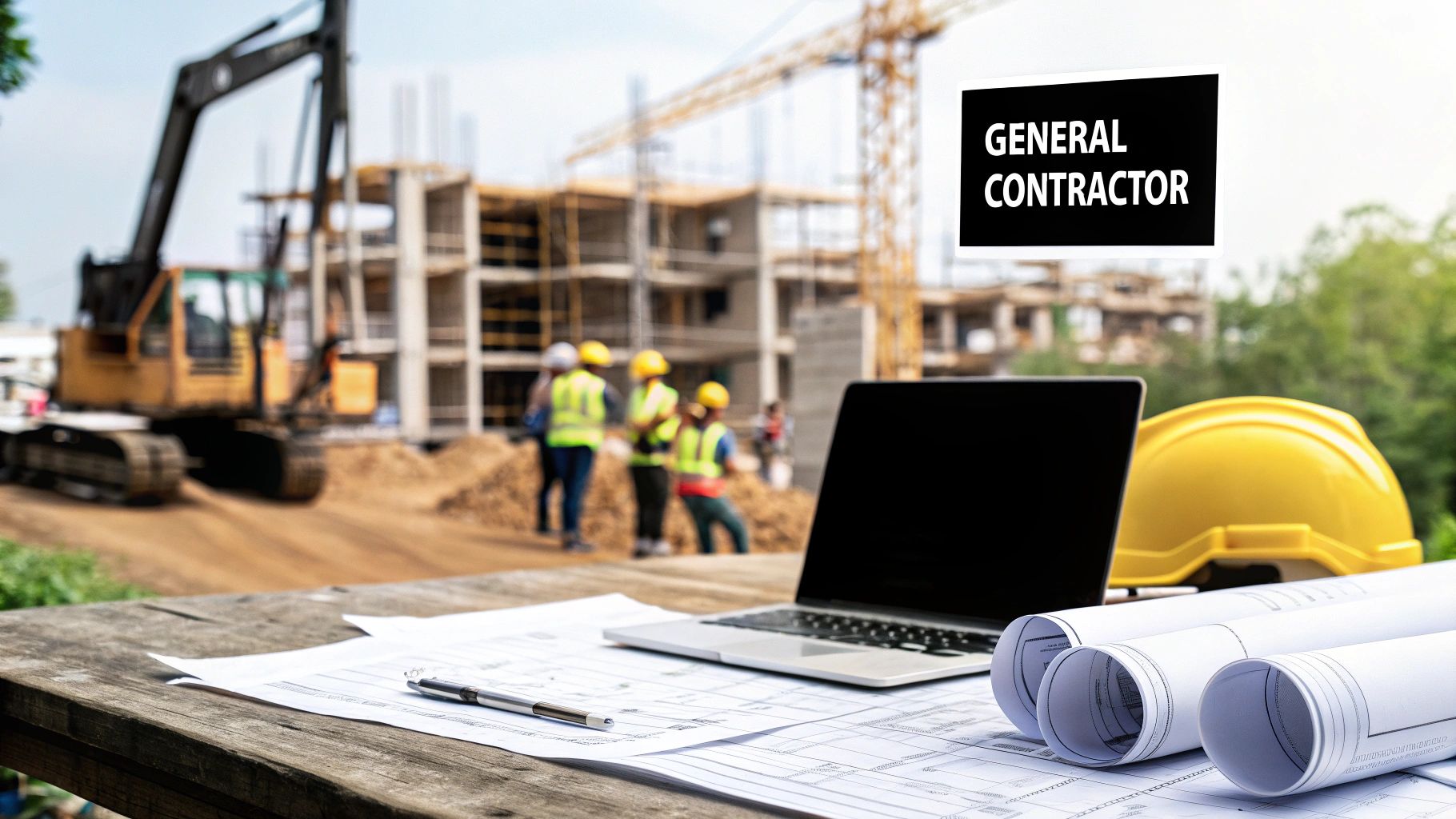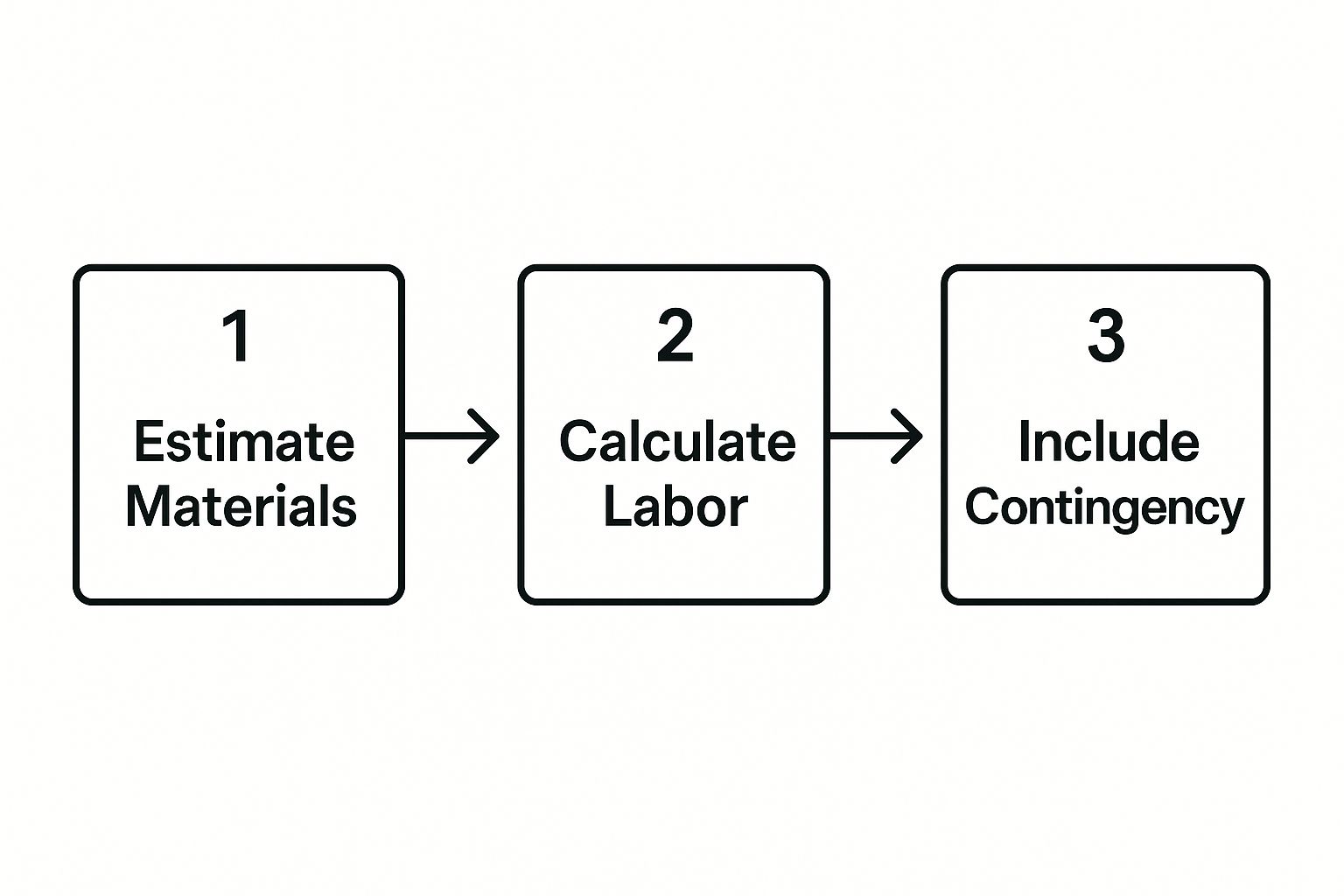
What Does a General Contractor Do? Your Project Guide
A general contractor is the person who turns your vision into a reality. They are the central manager for your construction project, taking charge of everything from budgets and schedules to the skilled teams on the ground. Think of them as your single point of contact, ensuring the entire build is finished on time, on budget, and exactly to your standards.
Your Project's Single Point of Command

Here’s a helpful analogy: if your construction project is an orchestra, the general contractor (or GC) is the conductor. You have the sheet music—the architectural plans—but you need an expert to make sure every instrument plays its part in perfect harmony. The GC coordinates all the specialists, from plumbers and electricians to painters and roofers, making sure they all work together seamlessly.
This leadership role is absolutely vital. Any construction project, big or small, has dozens of moving parts. A successful build means juggling material deliveries, coordinating schedules between different trades, and making sure every single task meets strict quality and safety codes. Without a GC, the property owner is left to manage that chaos, a job that can quickly spiral out of control.
The GC's Broad Authority
At its core, a general contractor's job is to manage the entire construction process from the first shovel in the ground to the final coat of paint. Their oversight is a huge reason why spending in the U.S. contractor and construction industry has climbed past $2 trillion. This number isn't just big; it shows how essential professional management is to the sector's success. You can get more details on this trend by reading about the growth of the U.S. contractor market.
A great GC provides immense value by orchestrating the day-to-day work, which frees you up to focus on the big-picture decisions instead of getting bogged down in operational details. They are, in every sense, your professional advocate on the job site.
Actionable Insight: When meeting a potential GC, ask them to describe a recent problem they solved on a project. Their answer will reveal their problem-solving style and how they handle pressure, giving you a real-world glimpse into how they operate beyond the sales pitch.
To give you a clearer picture, here’s a quick breakdown of a general contractor’s main duties. This table sums up the key areas they are responsible for throughout a typical project.
General Contractor Core Responsibilities at a Glance
| Responsibility Area | Key Actions and Oversight |
|---|---|
| Team Management | Hires, vets, and manages all specialized subcontractors like plumbers, electricians, and carpenters. |
| Budget & Finance | Creates detailed cost estimates, tracks all spending, and works to keep the project on budget. |
| Scheduling & Timelines | Develops a master project schedule, coordinates all trades, and ensures deadlines are met. |
| Permits & Compliance | Navigates local building codes, secures all necessary permits, and manages inspections. |
| Site & Safety | Maintains a safe, clean, and compliant construction site for all workers and visitors. |
| Material Sourcing | Orders, receives, and manages all building materials, ensuring quality and timely delivery. |
| Client Communication | Acts as the primary point of contact, providing regular updates and resolving any issues. |
As you can see, the role is incredibly comprehensive. Let's dig a little deeper into what these responsibilities look like in practice.
What a General Contractor Really Does
On a practical level, a GC's duties touch every phase of the project. Here are some of the most critical tasks they handle:
- Hiring and Managing Subcontractors: GCs have a network of trusted tradespeople. They are responsible for vetting, hiring, and scheduling all specialized labor needed for the job, from masons to HVAC technicians.
- Obtaining Permits and Licenses: They tackle the complex bureaucracy of local building departments, ensuring all the right permits are secured before work ever begins. This is a huge headache you won't have to deal with.
- Creating and Sticking to Budgets: A good GC will provide a detailed cost estimate and then meticulously manage expenses to keep the project within that agreed-upon financial plan.
- Developing Project Schedules: They create a realistic timeline and coordinate all moving parts—from demolition to final finishes—to make sure the project hits its key milestones and completion date.
- Ensuring Site Safety: The GC is ultimately responsible for maintaining a safe and OSHA-compliant construction site for everyone present. This includes everything from providing safety gear to running safety meetings.
The Core Services That Drive Your Project Forward

While we often think of a general contractor (GC) as the "project manager," what they actually do is so much more. Their real value comes from the specific, hands-on services that transform a set of blueprints into a physical building. These are the day-in, day-out actions they take to keep your project on track, your budget in check, and quality high from start to finish.
This critical work begins long before the first shovel hits the dirt. In fact, a skilled GC lays the groundwork for success during the pre-construction phase. They’ll deliver detailed cost estimates—not just guesses, but realistic budgets built on current material prices and labor rates. This is how a great GC starts protecting your investment from day one.
Pre-Construction Planning and Preparation
One of the most valuable services a GC provides is cutting through the red tape of permits and regulations. Every city and county has its own maze of rules, and a single misstep can halt your project for months. A seasoned GC knows the local codes inside and out and handles the entire permitting process for you.
Actionable Insight: Before signing a contract, ask your top GC candidate for a copy of their standard project schedule template. This document should clearly show how they sequence trades and manage milestones. It's a powerful tool to gauge their organization and foresight.
This initial planning sets the tone for the entire project. When it's done right, construction can begin with a clear roadmap, avoiding the common administrative headaches that can derail a build. This is especially important to understand when you consider the most common mistakes people make when building a custom home.
On-Site Project Execution and Management
With permits in hand and plans approved, the GC’s focus shifts to the job site. This is where their network of trusted tradespeople really shines. During the build, a GC’s core services include:
- Subcontractor Management: The GC is responsible for hiring and managing every specialist, from plumbers to roofers. They don't just find an electrician; they find the right licensed electrician who is fully qualified for the specific job, ensuring everything is safe and up to code. For example, while a GC might handle a small wiring fix, complex 240V work must legally be done by a licensed pro.
- Material Procurement: They take charge of ordering, inspecting, and scheduling all material deliveries. Thanks to their established relationships with suppliers, they can often secure better pricing and higher-quality materials than a homeowner could on their own.
- Job Site Supervision: Your GC is your eyes and ears on-site. They are there regularly to make sure work is on schedule, the quality meets the standards you expect, and the site remains safe and organized for everyone.
Post-Construction and Final Handover
A great contractor’s work isn’t done just because the construction is. The final phase is all about delivering a perfect, finished space and ensuring your long-term satisfaction. This means coordinating the final inspections with building officials to get that all-important certificate of occupancy.
They also pull together a complete package of all necessary paperwork, including warranties for appliances, materials, and their own workmanship. This clean, organized handover provides true peace of mind, proving every detail of your new space is accounted for and protected. It’s the final service that separates a good contractor from a truly professional one.
How a GC Guides You Through Each Project Phase
Think of a major construction project less like a single task and more like a journey with a clear beginning, middle, and end. An experienced general contractor is your seasoned guide for this entire trip, shifting their focus and skills to match the demands of each stage.
When you understand how a GC navigates these phases, the whole process feels less intimidating and more like a logical, predictable series of steps. Let's break down the three critical parts of that journey.

Pre-Construction: Planning and Strategy
This is where your dream gets its legs. The pre-construction phase is all about translating your vision into a solid, buildable plan. Here, the GC’s main job is to stop problems before they can even start. They dive deep into defining the project's scope, mapping out a realistic timeline, and, crucially, locking down the budget.
A good GC doesn’t just pull cost numbers out of thin air. They perform detailed estimates based on the architectural plans, up-to-the-minute material prices, and current labor rates in your area. This is also where their experience really pays off. They’ll spot potential roadblocks—like tricky site conditions or possible supply chain hiccups—and build a buffer into the plan. Just as importantly, they handle the often-frustrating task of securing all the necessary building permits, making sure everything is above board with local regulations from day one.
Actionable Insight: Request a line-item bid, not a lump-sum price. This forces the contractor to detail costs for labor, materials, and their fee. It not only provides transparency but also gives you a clear basis for discussion if you need to make changes to the scope later.
The Build: Construction and Execution
With a solid plan in place, it's time to break ground. In the construction phase, your GC switches hats from a strategic planner to an on-site field commander. Their focus shifts entirely to the day-to-day management of the job site, with constant supervision to ensure every detail matches the blueprints and meets quality standards.
A huge part of their role here is acting as the project's choreographer. They coordinate all the different skilled tradespeople—plumbers, electricians, framers, and so on. They sequence the work so it unfolds in the right order. You can't have the drywallers show up before the electricians have finished their wiring, after all. This careful orchestration is what keeps the project humming along smoothly, preventing costly delays and rework.
Post-Construction: Handover and Closeout
The project isn't truly done when the last nail is hammered. The post-construction phase is all about quality control and ensuring a smooth transition. Your GC will walk the entire site with you, creating a final "punch list" of any small adjustments or touch-ups that are needed. They then manage their crews to get these last items perfect.
Finally, the GC handles the official wrap-up. This means scheduling the final inspections with city or county officials to get the Certificate of Occupancy—the document that legally declares the space safe to use. They'll also hand over a complete package with all equipment manuals, product warranties, and other key documents. This meticulous closeout gives you the peace of mind and the information you need to enjoy and maintain your new space for years to come.
Why Hiring a GC Is an Investment, Not an Expense

It’s tempting to see a general contractor's fee as just another cost to trim from the budget. But that mindset misses the bigger picture. A great GC doesn’t just cost you money; they protect it. Hiring the right professional is one of the smartest financial moves you can make, turning a potential headache into a smoothly managed investment.
Think of it this way: you could try to manage your own retirement fund, but a seasoned financial advisor will almost always get you a better return while shielding you from unnecessary risk. A general contractor does the exact same thing for your construction project. Their entire job is to guard you against costly mistakes and deliver a high-quality outcome that stands the test of time.
Unlocking Savings Through Expertise
So, how do they actually save you money? It starts with their network. GCs have long-standing relationships with suppliers and subcontractors, which gives them access to bulk pricing and trade discounts you could never get on your own. Those savings on materials and labor go right back into your pocket.
Even more importantly, their experience prevents disasters before they happen. A veteran GC can look at a blueprint and immediately spot a design flaw that could lead to a leaky roof or a scheduling conflict that would cause weeks of delays. They fix the problem on paper, saving you a fortune in rework down the road.
Actionable Insight: A professional general contractor isn’t just managing tasks; they are managing risk. Your most effective action is to ask them for their insurance certificates before signing the contract. Request that you be named as an "additional insured" on their liability policy for added protection.
The Critical Shield of Liability and Compliance
This is where a GC's value becomes crystal clear. A legitimate general contractor is required to carry two essential types of insurance: general liability and workers' compensation. This is non-negotiable and protects you, the homeowner.
If a delivery truck accidentally damages your neighbor’s fence or a worker gets hurt on-site, the GC's insurance handles it. Without that coverage, you could be personally sued, putting your own assets on the line. The GC acts as a crucial financial shield.
Beyond insurance, they are experts in navigating the maze of building codes and permits. They ensure every part of the job is up to code and passes inspection. Need a 240V circuit for a new EV charger? A good GC knows that work must be done by a licensed electrician to be safe and legal. This commitment to doing things by the book is a fundamental part of what a general contractor does to safeguard your investment.
How to Choose the Right General Contractor
Selecting your general contractor is, without a doubt, the most critical decision you'll make for your entire project. It's the moment that sets the tone for everything to come. The right partner can make a complex build feel straightforward and deliver a final product that exceeds your expectations. The wrong one, however, can turn your dream project into a nightmare of blown budgets, missed deadlines, and constant stress.
This isn't a choice to be made lightly or based on a gut feeling alone. To find a professional who is not just a skilled builder but a trustworthy and communicative partner, you need a solid vetting process. Let's walk through how to do it right.
Start with the Essentials: Licenses and Insurance
Before you get dazzled by a beautiful portfolio, your very first step is to verify the basics. Every legitimate general contractor must have two things: a valid state license and proper insurance, which includes both general liability and workers' compensation.
Don't just take their word for it. You need to see the proof yourself. Most states provide an online portal to check a contractor's license status in real time. For example, the California Contractors State License Board has a simple online search tool. This is a non-negotiable step that protects you from liability and confirms they meet the state's minimum standards for professionalism. It's the fastest way to weed out unqualified candidates.
This initial check is your first line of defense. For a deeper dive into this part of the process, our full guide on how to find a good contractor lays out all the crucial steps.
Dig Into Their Portfolio and Past Work
Once you've confirmed a contractor is licensed and insured, it's time to see what they can do. A portfolio is more than just a gallery of nice photos; it’s a direct reflection of their experience and craftsmanship.
When you're looking through their past projects, keep these things in mind:
- Relevance: Have they built projects like yours before? A contractor specializing in sprawling commercial spaces might not be the best fit for the nuances of a historic home renovation. Look for experience that matches your project's scope and style.
- Quality of Finishes: Zoom in on the details. How clean are the paint lines? Does the tile work look precise? Is the trim perfectly fitted? The small things tell you a lot about their standards.
- Consistency: A truly great contractor will have a portfolio that shows a consistently high level of quality across many different projects, not just one or two hero shots.
Actionable Insight: Ask for the addresses of a few recently finished projects. Taking a drive by to see the work in person gives you a real-world feel for their craftsmanship and how well they maintain a job site. This simple action provides an unfiltered look at their work.
Interview Candidates and Check References
The interview is your opportunity to see if your personalities and communication styles click. A great contractor is an excellent listener and a clear communicator. They should make you feel heard and confident. With the construction industry seeing significant growth in recent years, as noted in reports on its strong economic outlook, professionalism and client management have become more important than ever.
Go into each interview prepared with a list of questions. Ask every candidate the same ones so you can compare their answers fairly:
- How do you manage change orders when unexpected issues pop up?
- What does your communication process look like? How often can I expect updates?
- Who is my main point of contact, and who will be on-site supervising the work each day?
- Could you provide three recent client references and three trade references (like a key supplier or subcontractor)?
And please, actually call the references! This is the step people often skip, but it's where you get the most honest feedback. Ask past clients about how the contractor handled the budget, if they stuck to the schedule, and what the overall experience was like. This is how you find the gems and make your final decision with confidence.
To help you stay organized during this crucial phase, use this checklist to evaluate each potential contractor.
General Contractor Vetting Checklist
| Vetting Step | What to Look For | Red Flags to Avoid |
|---|---|---|
| License & Insurance | A valid, active state license and proof of general liability and workers' compensation insurance. | An expired or suspended license, no insurance, or hesitation to provide documentation. |
| Portfolio Review | Projects similar to yours in scope and style, with high-quality finishes and attention to detail. | A portfolio with only a few projects, poor-quality photos, or work that doesn't match your style. |
| Initial Interview | Clear communication, professional demeanor, and thoughtful answers to your questions. | Vague answers, poor listening skills, or a dismissive or rushed attitude. |
| Reference Checks | Glowing reviews from past clients and positive feedback from suppliers and subcontractors. | Difficulty providing references, or lukewarm/negative feedback from the ones they do provide. |
| Bid & Contract | A detailed, itemized bid that is easy to understand. A professional and thorough contract. | An unusually low bid, a "lump sum" price with no detail, or high-pressure sales tactics. |
Using a structured approach like this checklist removes the guesswork. It allows you to objectively compare your options and ensures you’re partnering with a true professional who will bring your vision to life.
Frequently Asked Questions About General Contractors
It’s completely normal to have questions when you’re diving into a construction project. Even once you get the gist of what a general contractor does, some of the finer points can still be a little fuzzy. Let's clear up some of the most common questions we hear from clients.
Think of these as the quick, straightforward answers you need to feel confident moving forward.
What Is the Difference Between a General Contractor and a Subcontractor?
I like to use a movie set analogy here. The general contractor, or GC, is the director. They’re hired by the property owner (the studio) to manage the entire production—the budget, the schedule, and the big-picture vision. The director is the one who hires the entire crew and makes sure everyone works together to create the final film.
A subcontractor, on the other hand, is a specialist on that crew. They’re the expert lighting technician, the sound engineer, or the stunt coordinator. A GC hires them for one specific job, whether it’s plumbing, electrical work, or roofing. The key thing to remember is that subcontractors report to the GC, not to you. This chain of command is what keeps a project from descending into chaos.
How Do General Contractors Get Paid?
This is something that should always be spelled out clearly in the contract before a single nail is hammered. Transparency is key. There are a few common ways this works:
- Fixed-Price: You agree on one single, all-inclusive price for the entire project. It’s simple, predictable, and great for projects with a very clear and unchanging scope.
- Cost-Plus: With this model, you pay for the actual costs of the project—all the materials, labor, etc.—plus an agreed-upon fee or percentage that covers the GC’s overhead and profit.
- Time and Materials (T&M): This is pretty similar to cost-plus, where you pay for the hours worked and the materials used. It's often a good fit for smaller projects or when the full scope is hard to pin down from the start.
No matter the structure, you’ll almost never pay the full amount upfront. Payments are typically made in installments based on hitting specific project milestones, like "foundation poured" or "framing inspection passed."
Do I Need a General Contractor for a Small Renovation?
Honestly, it all comes down to complexity. If your project only involves one type of work—say, you just need a few rooms painted or a leaky faucet replaced—you can absolutely hire a painter or a plumber directly. No problem there.
But the second your project involves multiple trades, requires permits, or touches anything structural, a GC becomes invaluable. Think about a kitchen remodel. You’ll need a plumber, an electrician, a cabinet installer, a drywaller, and a painter. A GC is the person who coordinates that complex dance, making sure everything happens in the right order and meets code. Without that coordination, you risk expensive delays and rework.
Actionable Insight: The rule of thumb is this: if your project requires a permit, you should strongly consider a general contractor. The permit process itself often signals a level of complexity that benefits from professional oversight.
What Should Be in a Contract with a General Contractor?
Your contract is the single most important document for protecting your investment and ensuring a smooth project. A handshake deal is a recipe for disaster, no matter how small the job. A true professional will always insist on a comprehensive contract.
At a minimum, your contract absolutely must include:
- A detailed scope of work that lists every task and material.
- The total price or a very clear breakdown of the cost structure.
- A specific payment schedule tied to project milestones.
- Projected start and completion dates.
- A clear process for handling change orders (because they happen!).
- Proof of the contractor’s license and insurance.
Getting these details in writing is non-negotiable. Before you sign anything, it’s a great idea to review a list of questions to ask a general contractor to make sure you've covered all your bases.
At South Eastern General Contractors, we believe a successful project is built on a foundation of trust and clear communication. If you're planning a project in North Carolina and want a partner dedicated to quality and transparency, we're here to help. Contact us today to discuss your vision.



